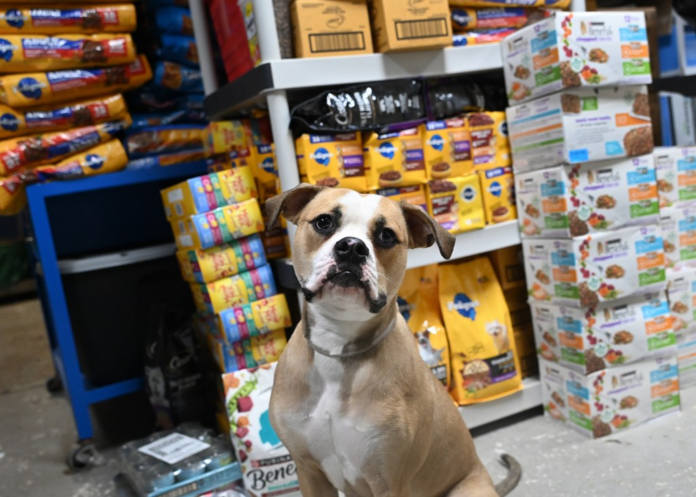As Maryland leaders shuffle millions of dollars to confront uncertain funding for food stamps and the ongoing government shutdown, animal rescue groups across the state are preparing to help an influx of pet owners in need.
“As this shutdown goes on and people run out of benefits, what are they gonna do?” asked Maria McGlosson, the adoption and foster coordinator for Tara’s House Animal Rescue in Sykesville. “They can’t feed their families. Can they feed their dogs? They cannot.”
The Trump administration’s decision to freeze benefits through the Supplemental Nutrition Assistance Program placed even more strain on low-income households and charityefforts, which have seen furloughed federal workers join lines for food as the longest government shutdown in American history continues.
Court orders have secured at least partial funding toward the program, which serves about 1 in 8 Americans and 1 in 9 Marylanders, but more than half its normal costs could fall onto state and local budgets. On Monday, for instance, Democratic Gov. Wes Moore released $62 million to provide full SNAP benefits for November, while officials in Anne Arundel and Baltimore counties have tapped into emergency dollars, as well.
The costs of owning a pet have surged in recent years. According to the Bureau of Labor Statistics, between 2023 and 2024, the price of urban veterinarian services alone rose more than twice the average amount of all consumer products. But the recent economic stress appears to be sending many pet owners over the edge.
Ryan Wetzel, operations manager at the Silver Spring rescue Tasca’s Love, told The Baltimore Sun on Wednesday that in the last 24 hours, four people had contacted their “very tiny” nonprofit to surrender their dogs.
In the past, that kind of request would happen about once a month, she said. But now, calls come in “more and more as time goes on,” she said.
“We already can’t help enough,” Wetzel said of the dogs.
On Tuesday, the Baltimore Humane Society issued “an urgent plea” for donations to its Bmore Kind Pet Food Bank, which has seen “a drastic increase in requests for help” between the pressures against SNAP and the federal layoffs and furloughs.
Although the Reisterstown-based nonprofit provides temporary housing and care to homeless animals, its food bank gives struggling pet owners free food and supplies “to keep pets fed and families together,” said spokesperson Alexa Jones.
In an interview, Jones said that since June, the humane society has received 234 surrender requests from residents, the exact same number from that time period last year.
However, Jones said there has been a “huge” difference in the number of stray animals that have not been reunited with their owners. She explained a part of the challenge comes when animals aren’t microchipped, but at the same time, she said owners aren’t searching for the lost animals either.
“It’s just very interesting when people don’t come forward,” Jones said. “It’s hard not to wonder why.”
Other shelters and pet care organizations are offering services directly to federal government workers.
On Oct. 30, the Howard County Animal Control & Adoption Center asked anyone suffering from the shutdown or food insecurity to learn more about their Pet Food Bank, which serves about 300 people annually. That came after the Maryland SPCA held a supply giveaway in Baltimore for employees affected by the shutdown. Kibble, crates, toys and leashes and more were available to anyone who brought a valid federal ID or their most recent paystub.
Sometimes, a food pantry is not enough for pet owners, and a more permanent change is necessary.
Tara’s House connects dogs facing euthanasia from shelters with foster homes and pays for all their food and medication. There’s always a need for foster parents, McGlosson said, but that need is now heightened as the Carroll County rescue receives surrender requests every day.
Health is often a factor, like an older owner having to move into a community that doesn’t allow pets. But McGlosson said that over the past month, economic problems like foreclosures and job loss have become more common.
“Normally the people are being very honest in that they cannot keep the dog,” McGlosson said, describing them as good-faith, albeit heart-breaking decisions.
Anne Shroeder, founder of Star Gazing Farm Animal Sanctuary in Montgomery County, said that although she hasn’t seen an increase in dog surrenders at the farm — which has sheep, goats, cows, camelids and even a chinchilla — she’s come across several posts online from pet owners looking for help.
“People shouldn’t be shy, especially if they’re asking on behalf of their animals,” she said.
Both Shroeder and McGlosson said the last thing rescue groups want to see is people turning in their pets. Many organizations have policies that if someone can’t keep their pet, the animal must be returned to the group they were adopted from — avoiding the shelter many had already been rescued or rehabilitated from.
Surrender “should be the last resort,” Shroeder said. “There is help out there.”




